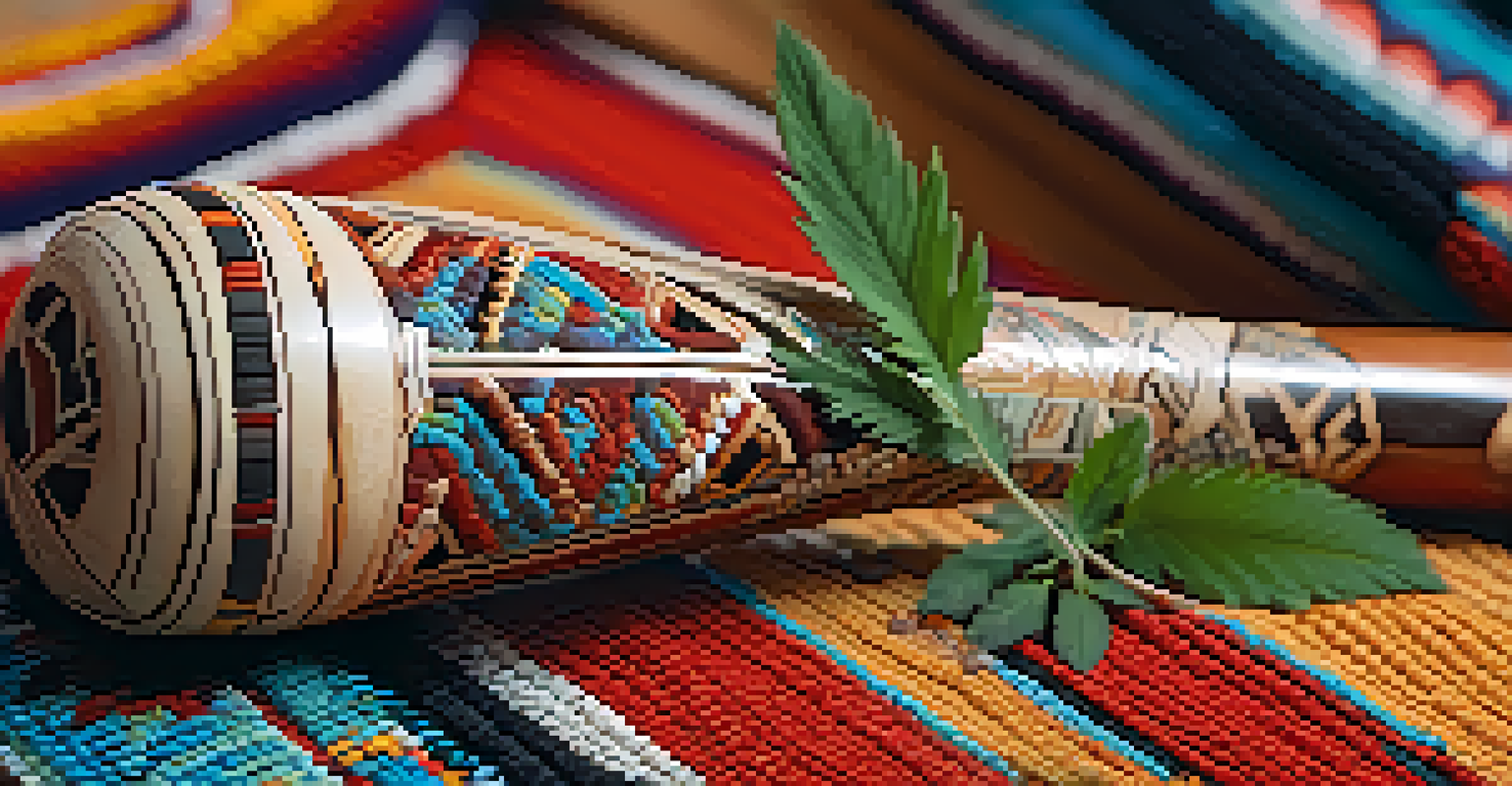Exploring Ancient Rituals: Cannabis in Indigenous Cultures

Understanding the Historical Significance of Cannabis
Cannabis has been used for thousands of years, not just for its psychoactive properties, but as a sacred plant in many cultures. Its history stretches back to ancient civilizations, where it was often revered in spiritual practices. Indigenous peoples viewed cannabis as a gift from the earth, a bridge between the physical and spiritual realms.
Cannabis is a plant that has been used for thousands of years, not just for its psychoactive properties, but also for its potential to foster connection and introspection.
From ancient India to the indigenous tribes of North America, cannabis was utilized to enhance rituals, promote healing, and connect with the divine. These practices were often steeped in rich traditions that emphasized communal bonding and respect for nature. In these cultures, the plant wasn't just a resource; it was a vital part of their identity and worldview.
Understanding this historical context helps us appreciate the cultural significance of cannabis beyond its recreational use. It reminds us that many indigenous cultures have long recognized the plant's potential to foster connection, introspection, and spiritual insight.
Cannabis in Indigenous Spiritual Practices
In various indigenous cultures, cannabis was often incorporated into spiritual ceremonies and rites of passage. For instance, some Native American tribes used it in sacred pipes during rituals, believing it facilitated communication with the spirit world. This practice highlights the plant's role as a tool for enhancing spiritual experiences and deepening one's connection to the universe.

Similarly, in Hinduism, cannabis is associated with Lord Shiva, and its use during certain festivals is meant to honor the deity. Devotees consume it in different forms, believing it helps them attain higher states of consciousness and spiritual enlightenment. Such practices illustrate how cannabis is intertwined with belief systems, serving both as a sacrament and a source of inspiration.
Cannabis as a Sacred Plant
Cannabis has deep historical and spiritual significance in many cultures, serving as a bridge between the physical and spiritual realms.
These spiritual uses of cannabis reflect a deep respect for the plant and its potential to aid in personal and communal growth. They also underscore the idea that rituals involving cannabis are about more than just substance; they are about fostering a connection to the sacred and the community.
Healing Traditions: Cannabis and Medicinal Use
Beyond its spiritual applications, cannabis has also been valued for its medicinal properties in indigenous cultures. Many tribes have long recognized the plant's ability to alleviate various ailments, from pain relief to anxiety management. This traditional knowledge has been passed down through generations, showcasing a sophisticated understanding of herbal medicine.
The cultivation of cannabis is not merely a business; it's a way to reconnect with our cultural roots and assert our rights over the natural resources that have long been part of our heritage.
For example, in Traditional Chinese Medicine, cannabis has been utilized for centuries to treat conditions such as inflammation and digestive issues. Indigenous healers would often prepare cannabis in various forms, such as teas or tinctures, to harness its therapeutic benefits. This practice reflects a holistic approach to health, where mind, body, and spirit are interconnected.
Today, as modern medicine increasingly acknowledges the benefits of cannabis, these traditional practices offer a valuable perspective. They remind us that the healing properties of this plant have been recognized for ages, often intertwined with cultural identity and community well-being.
Rituals of Connection: Communal Use of Cannabis
Many indigenous cultures emphasize the communal aspects of cannabis use, particularly during rituals and gatherings. Sharing cannabis during ceremonies fosters a sense of unity and collective experience, allowing individuals to come together in celebration or mourning. This practice reinforces social bonds and encourages open communication among participants.
For instance, in some African cultures, cannabis is shared during communal gatherings to enhance storytelling and cultural transmission. These gatherings serve as a space for individuals to share experiences, wisdom, and collective memories, all while enjoying the calming effects of the plant. The act of sharing cannabis becomes a powerful symbol of togetherness and mutual support.
Healing Traditions and Practices
Indigenous cultures have long valued cannabis for its medicinal properties, utilizing it in herbal medicine to treat various ailments.
This communal use of cannabis not only strengthens social ties but also enhances the overall ritual experience. It transforms individual reflection into a collective journey, allowing participants to explore their spirituality in a supportive environment.
Contemporary Indigenous Practices and Cannabis
In recent years, many indigenous communities have begun to reclaim their traditional practices surrounding cannabis. As legal frameworks around the plant evolve, these communities are finding new ways to integrate cannabis into their cultural practices. This resurgence is not only about reconnecting with ancestral traditions but also about asserting their sovereignty and rights over natural resources.
Some tribes are establishing cannabis businesses that honor their cultural heritage while providing economic opportunities. These ventures often focus on sustainable practices and educating the public about the historical significance of cannabis in their cultures. By doing so, they are bridging the gap between traditional knowledge and contemporary society.
This modern renaissance of cannabis use within indigenous communities reflects a broader movement toward cultural revitalization. It highlights the importance of recognizing and respecting the knowledge systems that have existed for centuries, as well as the need to honor the sacredness of the plant.
Legal and Ethical Considerations Surrounding Cannabis
As cannabis legalization spreads across various regions, it's crucial to consider the legal and ethical implications for indigenous communities. Many of these communities have historically faced marginalization, and the commercialization of cannabis can pose risks to their cultural practices and rights. It's essential to approach this topic with sensitivity and respect for their sovereignty.
Moreover, there is a growing concern about the exploitation of indigenous knowledge for profit without proper acknowledgment or compensation. Ethical cannabis practices must prioritize partnerships with indigenous peoples, ensuring that they are at the forefront of decisions regarding the use and commercialization of cannabis. This includes respecting their traditional knowledge and ensuring they benefit from the economic opportunities that arise.
Community and Connection through Cannabis
Communal use of cannabis during rituals fosters unity and enhances social bonds, transforming individual experiences into collective journeys.
Navigating these legal and ethical considerations requires a collaborative approach. By fostering dialogue and understanding, we can create a more equitable landscape that honors the rights and traditions of indigenous cultures while embracing the potential benefits of cannabis.
Looking Ahead: The Future of Cannabis in Indigenous Cultures
The future of cannabis in indigenous cultures holds both promise and challenges. As more communities explore the potential benefits of cannabis, there is an opportunity for cultural resurgence and economic empowerment. However, it is vital to ensure that these efforts are rooted in respect for traditions and the environment.
Education plays a key role in shaping the future of cannabis use within these cultures. By sharing knowledge about traditional practices, healing properties, and sustainable cultivation methods, indigenous communities can empower themselves and others. This educational approach fosters a deeper understanding of cannabis, moving beyond stigma to recognize its cultural significance.

Ultimately, the future of cannabis in indigenous cultures will depend on the balance between honoring ancestral traditions and embracing modern opportunities. By fostering a respectful dialogue between cultures, we can pave the way for a future where cannabis is celebrated as a sacred plant, benefiting both people and the planet.